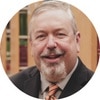
Mid-America Fits the Bill
In a recent issue, I addressed the importance of seminary education. Of course, one may not argue that God’s Word requires seminary, as if Moses came down the mountain with such a command. However, I argued in the September 2024 Messenger article that the learning necessary for effective pastoral ministry is ordinarily secured by study in a theological seminary. Where else will one receive the wide range of theoretical and practical training needed for pastoral ministry besides studying at a theological seminary? This leaves the question of which seminary one should attend unanswered. Unsurprisingly, as I indicated in that article, I believe Mid-America Reformed Seminary best fits the bill. Assertion, however, is not proof, and I acknowledge that I need to produce evidence to support the claim. Why Mid-America? I will seek in this article to demonstrate the validity of my contention that Mid-America, taken on the whole, stands head and shoulders above other confessional Reformed and Presbyterian institutions and should be given the most serious consideration by all interested in kingdom service, particularly those pursuing pastoral ministry.
Let me say at this point that this should not be taken to be a criticism of like-minded seminaries. Some may take it that way because I maintain that Mid-America is the best qualified to carry out its task. I say this honestly and earnestly, and I hope, humbly, not to denigrate any fellow seminary but to set forth that Mid-America, in the aggregate, given its strengths, rises to the top. Doubtless, other institutions could, at any point in this piece, aver, “We do that as well!” This article does not dispute that other institutions may do any number of the things I delineate as marking Mid-America; however, I believe that only Mid-America offers the whole package.
Historically, Mid-America has pursued a classical approach to theological education. The four divisions of theological seminary study have served to organize our curriculum: Biblical studies, ecclesiastical studies, doctrinal studies, and ministerial studies. We continue to employ this approach but, in more recent years, have thought particularly about how we might better equip our students not only in gathering the saints by preaching the gospel but also in discipling them through the means of grace regularly employed in the church. It is not enough, in other words, that folk merely be in the church, but that they grow and flourish in the Christian faith as a part of the church.
In our Reformed and Presbyterian churches, we should not settle for church growth simply because our already committed families have children, thereby adding to the numbers. Let there be no confusion: we welcome and cherish such church growth through family growth. We need, in addition to that, a commitment to be outreaching and ingathering so that we are not simply ingrown but also truly ingathering the lost, engaging in both fellowship and hospitality, the latter being a love that we show to strangers as well as to our friends.
This commitment to evangelism and discipleship has come to a particular expression in the development of our Center for Missions and Evangelism. The Center has several planks in its strategy for carrying out its purpose better to imbue our students and churches with a sense of all involved in the Great Commission, that call of the Lord, by his Spirit, to minister so that the church grows, both extensively, among all the nations, and intensively, God’s Word being applied to the whole lives of those in it. The Center intends to carry out this training task through four methods, which I adumbrate: classroom instruction, conferences, cohorts, and practical internships. Perhaps it’s worth noting that while several constituent churches have outlined what they would like through theological education in their church orders, no seminary offers more to these churches than Mid-America. To take just one example of the churches that furnishes us with more ministerial candidates than any other, the URCNA: its seminary guidelines for ministerial candidates, as set forth in its Church Order, are fully met by Mid-America Reformed Seminary in its M.Div. degree program. I am not aware of another seminary that meets all the church order guidelines of the URCNA. Detailing this would be appropriate in another article.
In the first area of the CME’s contribution, classroom instruction, we have made some needed curricular changes, adding required and elective courses to our M.Div. program. We now have classes in pastoral leadership and spiritual formation, as well as classes in church renewal and revitalization, handling abuse in the churches, and a Reformed assessment of and approach to social justice. The second and third areas, conferences and cohorts, include taking the message to the churches and working with them to better their church planting and missionary efforts and to assist them in those areas. The last area involves exceptional work that our students may be offered to do in the churches, including funded internships in church planting and foreign missionary contexts. All these courses are designed to equip our ministerial students to serve in our current culture better and to bring to bear the Word of God and the Reformed tradition to our needy world even in all its current confusion and darkness.
These courses and this commitment to missions and evangelism should not be seen as taking the Seminary in a new direction but as taking the Seminary better and more fully where, in its best intentions, it was always intended to go. This is part of our renewed approach to our historic and classic approach to theological education. Let us now focus on those four divisions and the new insights being applied to them.
The first, or biblical division, begins with multiple courses in the original languages. Some students come into the M.Div. program with all of their Greek, and even a few come with all of their Hebrew. If one already has that, ascertained by coursework and testing, one does not need to take it with us. Still, we find it essential to continue teaching the languages so that our students can gain sufficient competence to work in the Old and New Testaments in their original languages. All our courses in the actual Bible books require this as a prerequisite and continue to test students in the languages. Many schools no longer offer and require work in the original languages and do not teach their Old and New Testament courses working with the original languages in the classroom.
The courses in the Old and New Testament books seek to bring the best in exegesis, biblical theology, and related disciplines to bear, all with a commitment to a thoroughgoing Reformed hermeneutics. All of Mid-America’s teachers are pastors, sometimes with many years of experience, so they bring the specialized knowledge of their subjects, reflected in their Ph.D. work and years of other research, together with proper pastoral and homiletic sensibility. They especially excel in redemptive-historical theology: putting all exegesis together in a chronological, developmental fashion that shows that the Bible is all about Christ in every period of the history of salvation, either in anticipation of redemption accomplished or in its being completed by our Lord and applied by the Holy Spirit.
In the ecclesiastical division, we have four courses covering all the significant periods of church history, including one’s denominational history. Coupled with this, the last course includes work and testing in the respective church orders. Again, this is unusual as it is a requirement, not an elective course. We employ instructors who are considered experts in the history and polity of those denominations to teach these courses.
In the third division, doctrinal studies, we have systematic theology that takes into account the aforementioned disciplines of exegetical theology, biblical theology, and historical theology as well, all in seeking to treat each theological subject fully: prolegomena (including apologetics), theology proper, anthropology, Christology, pneumatology, ecclesiology, ethics, and eschatology. Unlike many other schools today, we do not have merely one or two theology courses that cover all these subjects, but we treat them with their due as separate courses. Our approach to apologetics, e.g., witnesses how we always seek to be informed in the encounter of Christianity with all forms of unbelief, whether other world religions, Christian cults, and all the forms of modernism, post-modernism, and the like.
In the fourth division, our ministerial studies courses are taught by experienced churchmen seeking to integrate all the previously cited divisions in our homiletics (including rich application as part of our textual-thematic method) and pastoral practice, especially as that gets worked out in the field experience of our Ministerial Apprenticeship Program (MAP). I’ve talked about what the CME has brought to Mid-America, but MAP has also brought a bounty of field experience into our ministerial training.
Here is a recent description of the program we furnished to our accreditors (ATS). In addition to their faculty advisors, each student preparing for the ordained ministry is assigned to a local ministerial supervisor who will meet with, mentor, and evaluate them regularly. They are also required to perform ministry activities in a local church context during each academic year, including specific minimum amounts of teaching and preaching, and to have two summer internships in churches elsewhere. The details of the MAP requirements are fairly extensive compared to the practica requirements at many other seminaries.
Ministerial supervisors also meet with each student, the MAP director, and the student’s faculty advisor at the end of the first and second years of instruction to review personal and professional progress and set goals for the future. This strong co-curricular component to education helps ensure that students are not only learning in the classroom but also being developed personally, spiritually, and in their vocational skillset and performance. MAP furnishes many analysis points, like a theological colloquium with various groups of students and faculty that reprises and responds to a problem that has arisen in field study.
The students in our M.Div. program are men recognized as gifted by the local church (they must be endorsed by their pastor and local body of elders). We seek to ensure they will not incur debt in their studies by having a generous student aid program and available scholarships. Those in the MTS program, which admits men and women, receive a two-year solid theological grounding for every profession (so that they can best live out their faith as they practice medicine, law, etc.), as well as for teaching, translating, counseling and other activities commonly associated with seminary training for the laity.
Every faculty member is an ordained minister in a NAPARC church, serving in his church and on its behalf in his call as a teacher in the Seminary. Some serve in the local pastorate, and all of them have some years of experience in local pastoral ministry, particularly those who serve in ministerial studies. Some faculty members serve and have served the church at levels broader than the local church, on committees, in leadership positions at the classis and presbytery levels, and at the synodical/GA level, especially on study committees and significant standing or program committees. Much more could be said here, but perhaps it’s enough to note that the faculty are preeminently churchmen.
We’ve just begun to think together about how Mid-America excels in seminary education. Doubtless, future articles will explore this more, both by me and by others. For example, we could talk about why in-person education remains superior. In the past, Mid-America has been relatively modest about what it offers, sometimes painfully modest, at the risk of selling itself short. It’s time that we make our case for what we have to offer and do so clearly and fairly, not to the detriment of others, but to showcase what the Lord has given us here and share it with as many as possible.

Dr. Alan Strange is the Interim President and Professor of Church History at Mid-America Reformed Seminary.
Recent articles




